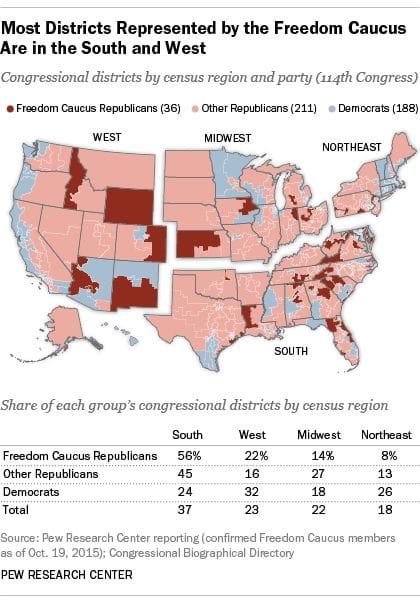Pew Study Shows Voters Should Not Underestimate The Importance of Primary Elections

The House Freedom Caucus. Chances are if there is a story about gridlock in the U.S. House over budgetary issues or the intra-party conflict within the GOP over who will replace outgoing U.S. House Speaker John Boehner, this name will appear at least once.
Pew Research reports that the House Freedom Caucus is composed of at least 36 of the most conservative members of the House. The caucus is likely a little larger than this, but 36 is the number Pew was able to confirm.
Chances are if a lawmaker took a hardline stance on defunding Planned Parenthood -- even if it meant shutting down the government -- or rejoiced at the news that Boehner was resigning, he or she has some degree of affiliation with the House Freedom Caucus.
Now, the common myth still perpetuated in mainstream political dialogue is that these lawmakers reflect a constituency that is simply further to the right and less likely to embrace compromise than many other Republican-dominated districts. However, Pew finds that this is not the case.
In fact, in a new report published Thursday, Pew's Fact Tank reveals that "the attitudes of Republicans living in Freedom Caucus members’ districts look very similar to those in other Republican-represented districts, and that the overall demographics of Freedom Caucus districts and other GOP-held districts are similar as well."
36 Freedom Caucus members identified by Pew Research Centerpolitical polarization
These findings are interesting, because it reveals a lot about the election process in most U.S. states.
How is that a more moderate Republican who believes in cooperation wins in Ohio and a more hardline conservative who takes a more confrontational approach wins in Florida when voters in these districts are not much different from each other?
Well, it is important to look at how these lawmakers are elected.
It is reported time and time again that over 90% of U.S. House races are considered safe for the incumbent or majority party in that district. These seats are not competitive and won't be competitive. This has been the case for years and the numbers never change.
If a lawmaker is elected in a solid Republican district, they really only needed to advance from the primary stage of the election process to win the entire race. It is highly unlikely that members of the majority party will vote for a Democrat or candidate outside the major parties -- some might, but an overwhelming majority won't.
In short, primaries have been proven to be an integral stage of the election process. There is little to no dispute over this fact, and in most states, the person who ends up winning an electoral district -- on the state and federal level -- depends on who shows up to vote in taxpayer-funded party primaries -- whether the system is closed, semi-closed, or open.
Turnout also happens to be dismal in the primary stage nationwide. In New Jersey, for instance, only 5% of registered voters might participate. So, if this 5 percent is mostly composed of voters who believe their lawmaker should solely stand on principle and think compromise is a dirty word, the politician elected is likely to do what he must to appease this group of voters.
What is interesting to note is that analysts at the Pew Research Center reached out to U.S. Rep. Darrell Issa's (R-Calf.) office to confirm whether or not he was a member of the House Freedom Caucus. However, Issa's spokesperson would neither confirm nor deny his membership in the caucus.
California has a unique voting system when compared to the rest of the United States. All candidates and voters, regardless of party affiliation, participate on a single primary ballot and the top two vote getters move on to the general election no matter their party or how much of the vote they get. Washington state is the only other state that uses a nonpartisan, top-two primary for all statewide and congressional races.
According to the 15-Day Report of Registration ahead of the 2014 midterm elections, 40 percent of registered voters in California's 49th Congressional District (Issa's district) were Republican, nearly 30 percent were Democrat, and a quarter were registered No Party Preference. It is possible that there is a correlation between how primaries are conducted in California, the electoral makeup of Issa's district, and the lawmaker's reluctance to associate with the House Freedom Caucus.
While such a correlation cannot be empirically proven, it is interesting to consider. What cannot be disputed is the fact that voters should not underestimate the importance of primary elections and how it impacts the type of lawmaker that ends up representing them (or not representing them) in Congress.



